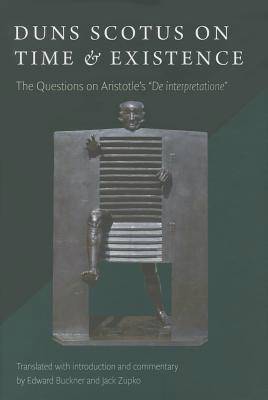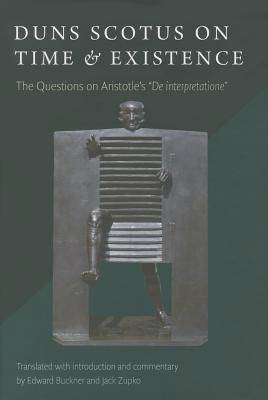
- Afhalen na 1 uur in een winkel met voorraad
- Gratis thuislevering in België vanaf € 30
- Ruim aanbod met 7 miljoen producten
- Afhalen na 1 uur in een winkel met voorraad
- Gratis thuislevering in België vanaf € 30
- Ruim aanbod met 7 miljoen producten
Duns Scotus on Time and Existence
The Questions on Aristotle's 'de Interpretatione'
John Duns ScotusOmschrijving
Translated, with Introduction and Commentary, by Edward Buckner and Jack Zupko
Duns Scotus (c. 1265-1308) is one of a handful of figures in the history of philosophy whose significance is truly difficult to overestimate. Despite an academic career that lasted barely two decades, and numerous writings left in various states of incompletion at his death, his thought has been profoundly influential in the history of western philosophy.
The Questions on Aristotle's 'De interpretatione' is an early work, probably written at Oxford in the closing decade of the thirteenth century. The questions, which have come down to us in two sets ('Opus I' and 'Opus II'), most likely originated from Scotus's classroom lectures on Aristotle's text, a work now known by its Latin name, De interpretatione.
The De interpretatione (or Perihermenias in the original Greek) was understood in the medieval university as a work of dialectic or logic, although the text itself deals with subjects we would nowadays consider to belong to the intersection of metaphysics and the philosophy of language: the semantics of time, existence, modality, and quantification. At its heart is the important and still philosophically relevant question of how we can talk about things which no longer exist, or which do not yet exist. The topics covered include reference and signification; existence and essence; truth and its relation to things. What is the relationship between existence in reality and existence in the understanding? Does the meaning of a name depend on the existence of the objects falling under it? Is the present time all that exists? If a proposition about the future can be true now, what now makes it true?
The English translation includes an extensive commentary explaining and elaborating on some of the more difficult ideas Scotus develops in the work, placing them in the context of the teaching of logic and metaphysics in late-thirteenth century Europe.
ABOUT THE TRANSLATORS
Edward Buckner is an independent scholar. Jack Zupko is at the University of Alberta, Canada.
PRAISE FOR THE BOOK
"An extremely significant contribution to the study of Scotus, and, in particular, to the background concepts/sources for some of his more important philosophical positions." --Mary Beth Ingham, Franciscan School of Philosophy, Berkeley
Specificaties
Betrokkenen
- Auteur(s):
- Uitgeverij:
Inhoud
- Aantal bladzijden:
- 376
- Taal:
- Engels
Eigenschappen
- Productcode (EAN):
- 9780813226033
- Verschijningsdatum:
- 5/09/2014
- Uitvoering:
- Hardcover
- Formaat:
- Genaaid
- Afmetingen:
- 149 mm x 246 mm
- Gewicht:
- 689 g

Alleen bij Standaard Boekhandel
Beoordelingen
We publiceren alleen reviews die voldoen aan de voorwaarden voor reviews. Bekijk onze voorwaarden voor reviews.











